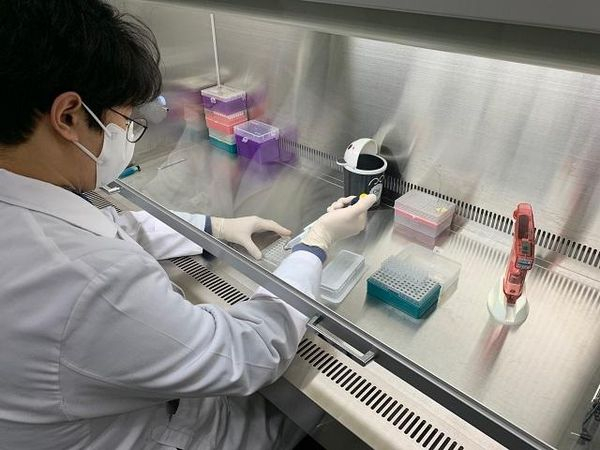COVID-19 vaccine
Eyegene to kick off KoreaŌĆÖs first mRNA clinical trial
After approval from the countryŌĆÖs drug administration, Eyegene will conduct phase I tests at Seoul Asan Medical Center
By Jul 01, 2021 (Gmt+09:00)
1
Min read
Most Read
Samsung shifts to emergency mode with 6-day work week for executives


CJ CheilJedang to sell feed, livestock unit for $1.4 bn


Samsung Electronics' key M&A man returns; big deals in the offing


Affinity to buy SK Rent-a-Car at $572 mn, more deals expected


Keppel REIT to sell Seoul-based prime office T Tower



Eyegene Inc. will be South KoreaŌĆÖs first vaccine maker to conduct clinical tests of messenger ribonucleic acid (mRNA) COVID-19 vaccines.
Ealier this year in April, the company had shared plans to start a domestic phase I trial within June with commercialization plans for 2022.
The biopharma firm said on June 30 that it has submitted an investigational new drug (IND) filing to the Ministry of Food and Drug Safety (MFDS) to begin phase I and IIa clinical trials of its vaccine candidate, EG-COVID. ┬Ā
Once approved by the drug administration, Eyegene will conduct its phase I trial at Seoul Asan Medical Center and phase IIa tests with multiple institutions.┬Ā
According to the company, phase I will test 135 healthy adult participants divided into three groups of 45. The first group will get 50 micrograms (╬╝g) of EG-COVID, while the second and third groups will respectively be injected 100 ╬╝g and 200 ╬╝g.
Phase IIa will only have two groups, instead of three, giving different dose rates on a total of 125 healthy adult participants.
Eyegene said that it will kick off phase IIa trials immediately after the interim test results from its phase I trials come out during the second half of 2021.
EyegeneŌĆÖs EG-COVID uses a liposome-based mRNA delivery system instead of wrapping the mRNA molecules with lipid nanoparticles (LNP). The LNP method is not only used by the industry leaders such as Pfizer and Moderna, but also will be used by KoreaŌĆÖs mRNA vaccine consortium formed earlier this week.
ŌĆ£Anaphylaxis shocks do not occur in the liposome-based method,ŌĆØ said an Eyegene official. Anaphylaxis is a severe, potentially life-threatening allergic reaction to antibodies used in vaccines.
Eyegene also explained that unlike the LNP-based mRNA vaccines currently available, which require ultra-low-temperature storage, its EG-COVID candidate can be freeze-dried and stored slightly above the freezing point at around 2-8┬░C
Write to Woo-sub Kim at duter@hankyung.com
Daniel Cho edited this article.
More to Read
-
 COVID-19 vaccineKoreaŌĆÖs pharma consortium to develop mRNA vaccines by 2022
COVID-19 vaccineKoreaŌĆÖs pharma consortium to develop mRNA vaccines by 2022Jun 30, 2021 (Gmt+09:00)
2 Min read -
 [Exclusive] COVID-19 vaccinesSamsung Bio plans to manufacture mRNA drug substance from 2022
[Exclusive] COVID-19 vaccinesSamsung Bio plans to manufacture mRNA drug substance from 2022May 31, 2021 (Gmt+09:00)
2 Min read -
 COVID-19 vaccine partnershipSamsung Biologics to make ModernaŌĆÖs mRNA vaccine from Q3
COVID-19 vaccine partnershipSamsung Biologics to make ModernaŌĆÖs mRNA vaccine from Q3May 23, 2021 (Gmt+09:00)
4 Min read -
 Vaccine businessGenexine exports COVID vaccine candidate to Indonesia
Vaccine businessGenexine exports COVID vaccine candidate to IndonesiaApr 28, 2021 (Gmt+09:00)
3 Min read
Comment 0
LOG IN


